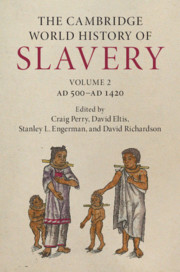Book contents
- The Cambridge World History of Slavery
- The Cambridge World History of Slavery
- The Cambridge World History of Slavery
- Copyright page
- Contents
- Figures
- Contributors
- Chapter 1 Slavery in the Medieval Millennium
- Part I Captivity and the Slave Trade
- Part II Race, Sex, and Everyday Life
- Part III East and South Asia
- Part IV The Islamic World
- Chapter 14 Slavery in the Islamic Middle East (c. 600–1000 CE)
- Chapter 15 Military Slavery in Medieval North India
- Chapter 16 Slavery in the Mamluk Sultanate
- Chapter 17 Slavery in the Early Modern Ottoman Empire
- Part V Africa, the Americas, and Europe
- Index
- References
Chapter 15 - Military Slavery in Medieval North India
from Part IV - The Islamic World
Published online by Cambridge University Press: 09 September 2021
- The Cambridge World History of Slavery
- The Cambridge World History of Slavery
- The Cambridge World History of Slavery
- Copyright page
- Contents
- Figures
- Contributors
- Chapter 1 Slavery in the Medieval Millennium
- Part I Captivity and the Slave Trade
- Part II Race, Sex, and Everyday Life
- Part III East and South Asia
- Part IV The Islamic World
- Chapter 14 Slavery in the Islamic Middle East (c. 600–1000 CE)
- Chapter 15 Military Slavery in Medieval North India
- Chapter 16 Slavery in the Mamluk Sultanate
- Chapter 17 Slavery in the Early Modern Ottoman Empire
- Part V Africa, the Americas, and Europe
- Index
- References
Summary
This chapter traces the establishment, and evolution of military slavery in north India between ca. 1000-1500. It will moreover investigate the interaction between war and society when it involves enslavement of captured civilians. Lastly, it will argue that the expansion of agriculture and the rise of a large peasant population that served as a potential source of mercenaries that eventually competed with slaves as a source of recruitment.
- Type
- Chapter
- Information
- The Cambridge World History of Slavery , pp. 362 - 382Publisher: Cambridge University PressPrint publication year: 2021

